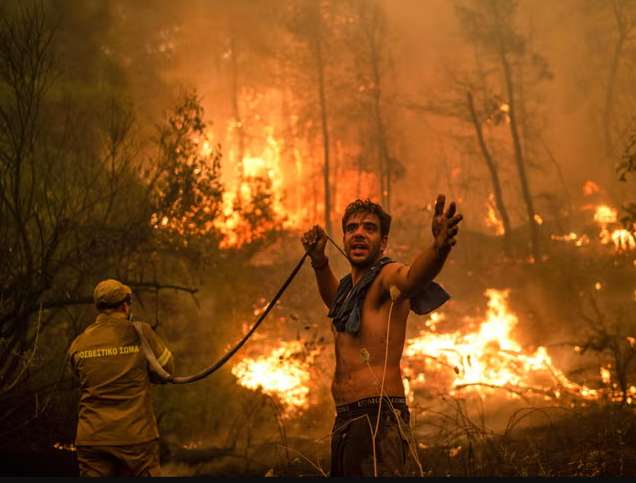Uncontrolled Fires Lead to Evacuations Amid Extreme Heat Conditions
Over the past two weeks, uncontrolled wildfires have wreaked havoc in parts of Greece and Turkey, forcing thousands to evacuate their homes and causing widespread destruction to dry forests. Greek Prime Minister Kyriakos Mitsotakis described the situation as a “nightmarish summer,” as firefighters struggled to contain the flames.
One of the most intense fires is raging on Evia, Greece’s second-largest island, where firefighters and residents are battling the blaze for the seventh consecutive day. The smoke and ash have been so thick that they blocked out the sun, casting an orange hue over the sky as the fire spread through the island’s rugged northern hills.
This fire is just one of many that have erupted across the Mediterranean since late July, exacerbated by a severe heatwave that has brought temperatures soaring to 45°C. Significant fires are also consuming forests and farmland in the Peloponnese region of southern Greece, with another major fire encroaching on the northern suburbs of Athens and Mount Parnitha national park. Fortunately, that fire has begun to diminish.
In neighboring Turkey, wildfires have been burning for 13 days in the southwestern province of Mugla, where firefighters continue to combat blazes in two locations. Turkish Agriculture and Forestry Minister Bekir Pakdemirli noted that while the situation is improving, it remains too early to declare full control over the fires.
The Mediterranean region is experiencing a spike in wildfires, with additional outbreaks reported in southern Italy, North Macedonia, and Montenegro. In Montenegro, a large fire approached residential areas in the Malo Brdo district of the capital, Podgorica.
Firefighting efforts have been bolstered by teams from over 20 countries across Europe and the Middle East, including a British team from Merseyside Fire & Rescue Service, which recently arrived in Greece to assist.
Areas most vulnerable to wildfires are characterized by large forests of highly flammable pine trees, which have become extremely dry due to the recent heatwave. The combination of high temperatures and dry conditions has led to more severe fire outbreaks, often ignited by human error or dry lightning. Shifting winds from the Aegean Sea have further exacerbated the situation, enabling the fires to spread rapidly.
Satellite images from the EU’s Earth Observation Program have revealed vast tracts of northern Evia burned by the wildfires, with flames cutting across the island from coast to coast. Experts warn that prolonged periods of hot, dry weather increase the risk of wildfires, providing ample fuel for the flames to consume.
Dr. Rory Hadden from the University of Edinburgh explained that as natural habitats dry out, they become more susceptible to burning, leading to more extensive wildfires. Dr. Thomas Smith from the London School of Economics noted that while wildfires are not uncommon in the Mediterranean, this year’s fires are particularly extensive in Turkey, indicating a significant increase compared to the average year.
The devastating wildfires occurring in southern Europe coincide with a critical report from the UN’s Intergovernmental Panel on Climate Change (IPCC), highlighting the urgent need to address the climate emergency. The report warns that global heating is accelerating sea level rise and intensifying extreme weather events, underscoring the importance of taking immediate action to mitigate climate change and its impact on natural disasters.

